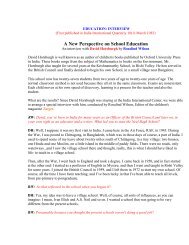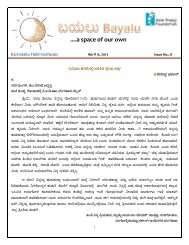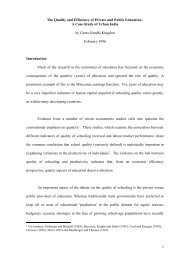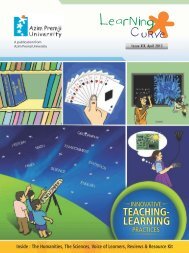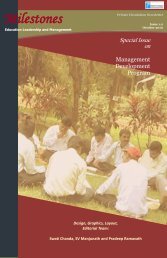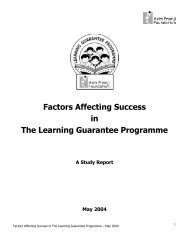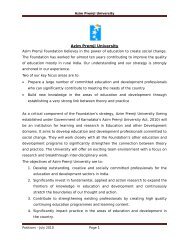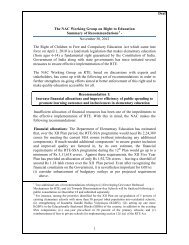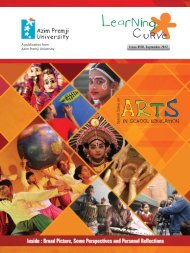Indesign Pagesnew.indd - Azim Premji Foundation
Indesign Pagesnew.indd - Azim Premji Foundation
Indesign Pagesnew.indd - Azim Premji Foundation
Create successful ePaper yourself
Turn your PDF publications into a flip-book with our unique Google optimized e-Paper software.
28<br />
Section E<br />
Why the Social Sciences Never Pulled Me<br />
Neeraja Raghavan<br />
What is the use of learning history?” As a thirteenyear-old,<br />
I unobtrusively slipped this question<br />
into the question box, hoping to hear my<br />
teacher’s illuminating answer. (I hadn’t the temerity to ask<br />
such a question to her face.) I can still recall how I waited<br />
eagerly for her to pull my question out of the box.<br />
There were a number of chits in the box that day.<br />
She took her time: tantalisingly, and ran through a number<br />
of other questions before she arrived at it - at the very end<br />
of the period. To my disappointment, she laughed it off,<br />
saying: “And the last question here is: What is the use of<br />
learning history?” All joined in her laughter, but my teacher<br />
gave no answer as she rose to leave.<br />
I was left to deal with my question on my own: something I<br />
did until the end of my school days, with no success. While I<br />
had demurely studied all the assigned subjects until the age<br />
of thirteen, I began to question their utility when a possible<br />
choice loomed ahead - in Class IX.<br />
“When something is over and done with, why should we<br />
bother to memorise it in detail?” I wondered. The glamour of<br />
Science was so overpowering, that no one had to convince<br />
me of its utility. Indeed, I cannot recall a single one of my<br />
classmates asking this question of Science: “What is the<br />
use of studying Science?” Boring? Yes, many felt it was so.<br />
Tough? Sure, some agreed. But ‘useless’? No one would<br />
have said so.<br />
Perhaps it was the very determined direction that the subject<br />
steered you to: a career as a doctor, or an engineer, or a<br />
scientist, or maybe it was just the ‘done thing’ to study it –<br />
whatever the case, no one had to convince my classmates<br />
(or me) about the need to study Science. Yes, some of us had<br />
our preferences, when we chose not to opt for Biology (in<br />
any case, I am not going to become a doctor, so why should<br />
I cut up frogs?), but Physics, Chemistry and Mathematics<br />
were part of our checked-in baggage. No doubt about that.<br />
Geography was even less of a felt necessity: it didn’t even<br />
carry the names of powerful people to salvage it. Who<br />
cared, really, if the temperate zones had deciduous trees or<br />
there were gold mines elsewhere? From poring over maps<br />
and mastering the skill of drawing them, to memorising<br />
climatic zones and the crops that these yielded, here was yet<br />
another subject that had<br />
few takers. I recall just one<br />
teacher advocating it as a<br />
‘logical subject’: but she,<br />
too, could not convince me<br />
of its use.<br />
In short, the periods<br />
devoted to the social sciences were the ones that drew<br />
the most yawns. We enlivened our classes by drawing<br />
moustaches and fi erce eyebrows on the pictures of the<br />
Moghul queens, and bindis and mascaraed lashes for the<br />
imposing kings. Passing these reworked portraits to each<br />
other, under our desks, we elicited quiet giggles as our only<br />
means of entertainment in the boring history classes. The<br />
only historical persona to escape our mutilating pen was<br />
the devastatingly handsome Lord Mountbatten: for obvious<br />
reasons.<br />
The patterns in Mathematics, the beautiful<br />
logic in Science, its unquestionable<br />
relevance to our immediate lives: I found<br />
all of these to be conspicuous by their<br />
absence in history and geography.<br />
The patterns in Mathematics, the beautiful logic in Science,<br />
its unquestionable relevance to our immediate lives: I found<br />
all of these to be conspicuous by their absence in history<br />
and geography.<br />
Which brings me to what I perceive as the source of<br />
magnetism in a subject: what pulls a learner to it? This is<br />
my surmise: anything that is taught should be at least one of<br />
these three things: relevant, useful or beautiful (or, at least,<br />
appealing) � from the point of view of the learner. Why, for<br />
instance, did science seem necessary to most of us? For one,<br />
it was extremely relevant. No one could deny that. Of course<br />
we needed to know about the laws of the Universe, the<br />
changes that could be wrought, the fl ora and fauna around<br />
Pg No: 128



